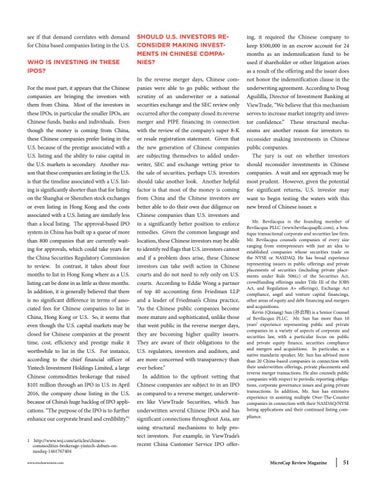see if that demand correlates with demand for China based companies listing in the U.S.
wHo is iNvestiNg iN tHese ipos? For the most part, it appears that the Chinese companies are bringing the investors with them from China. Most of the investors in these IPOs, in particular the smaller IPOs, are Chinese funds, banks and individuals. Even though the money is coming from China, these Chinese companies prefer listing in the U.S. because of the prestige associated with a U.S. listing and the ability to raise capital in the U.S. markets is secondary. Another reason that these companies are listing in the U.S. is that the timeline associated with a U.S. listing is significantly shorter than that for listing on the Shanghai or Shenzhen stock exchanges or even listing in Hong Kong and the costs associated with a U.S. listing are similarly less than a local listing. The approval-based IPO system in China has built up a queue of more than 800 companies that are currently waiting for approvals, which could take years for the China Securities Regulatory Commission to review. In contrast, it takes about four months to list in Hong Kong where as a U.S. listing can be done in as little as three months. In addition, it is generally believed that there is no significant difference in terms of associated fees for Chinese companies to list in China, Hong Kong or U.S. So, it seems that even though the U.S. capital markets may be closed for Chinese companies at the present time, cost, efficiency and prestige make it worthwhile to list in the U.S. For instance, according to the chief financial officer of Yintech Investment Holdings Limited, a large Chinese commodities brokerage that raised $101 million through an IPO in U.S. in April 2016, the company chose listing in the U.S. because of China’s huge backlog of IPO applications. “The purpose of the IPO is to further enhance our corporate brand and credibility.”1
1 http://www.wsj.com/articles/chinesecommodities-brokerage-yintech-debuts-onnasdaq-1461767404 www.stocknewsnow.com
sHoulD u.s. iNvestors reCoNsiDer maKiNg iNvestmeNts iN CHiNese CompaNies? In the reverse merger days, Chinese companies were able to go public without the scrutiny of an underwriter or a national securities exchange and the SEC review only occurred after the company closed its reverse merger and PIPE financing in connection with the review of the company’s super 8-K or resale registration statement. Given that the new generation of Chinese companies are subjecting themselves to added underwriter, SEC and exchange vetting prior to the sale of securities, perhaps U.S. investors should take another look. Another helpful factor is that most of the money is coming from China and the Chinese investors are better able to do their own due diligence on Chinese companies than U.S. investors and in a significantly better position to enforce remedies. Given the common language and location, these Chinese investors may be able to identify red flags that U.S. investors cannot and if a problem does arise, these Chinese investors can take swift action in Chinese courts and do not need to rely only on U.S. courts. According to Eddie Wong a partner of top 40 accounting firm Friedman LLP and a leader of Friedman’s China practice, “As the Chinese public companies become more mature and sophisticated, unlike those that went public in the reverse merger days, they are becoming higher quality issuers. They are aware of their obligations to the U.S. regulators, investors and auditors, and are more concerned with transparency than ever before.” In addition to the upfront vetting that Chinese companies are subject to in an IPO as compared to a reverse merger, underwriters like ViewTrade Securities, which has underwritten several Chinese IPOs and has significant connections throughout Asia, are using structural mechanisms to help protect investors. For example, in ViewTrade’s recent China Customer Service IPO offer-
ing, it required the Chinese company to keep $500,000 in an escrow account for 24 months as an indemnification fund to be used if shareholder or other litigation arises as a result of the offering and the issuer does not honor the indemnification clause in the underwriting agreement. According to Doug Aguililla, Director of Investment Banking at ViewTrade, “We believe that this mechanism serves to increase market integrity and investor confidence.” These structural mechanisms are another reason for investors to reconsider making investments in Chinese public companies. The jury is out on whether investors should reconsider investments in Chinese companies. A wait and see approach may be most prudent. However, given the potential for significant returns, U.S. investor may want to begin testing the waters with this new breed of Chinese issuer. n Mr. Bevilacqua is the founding member of Bevilacqua PLLC (www.bevilacquapllc.com), a boutique transactional corporate and securities law firm. Mr. Bevilacqua counsels companies of every size ranging from entrepreneurs with just an idea to established companies whose securities trade on the NYSE or NASDAQ. He has broad experience representing issuers in public offerings and private placements of securities (including private placements under Rule 506(c) of the Securities Act, crowdfunding offerings under Title III of the JOBS Act, and Regulation A+ offerings), Exchange Act compliance, angel and venture capital financings, other areas of equity and debt financing and mergers and acquisitions. Kevin (Qixiang) Sun (孙启翔) is a Senior Counsel of Bevilacqua PLLC. Mr. Sun has more than 10 years’ experience representing public and private companies in a variety of aspects of corporate and securities law, with a particular focus on public and private equity finance, securities compliance and mergers and acquisitions. In particular, as a native mandarin speaker, Mr. Sun has advised more than 20 China-based companies in connection with their underwritten offerings, private placements and reverse merger transactions. He also counsels public companies with respect to periodic reporting obligations, corporate governance issues and going private transactions. In addition, Mr. Sun has extensive experience in assisting multiple Over-The-Counter companies in connection with their NASDAQ/NYSE listing applications and their continued listing compliance.
MicroCap Review Magazine
51
